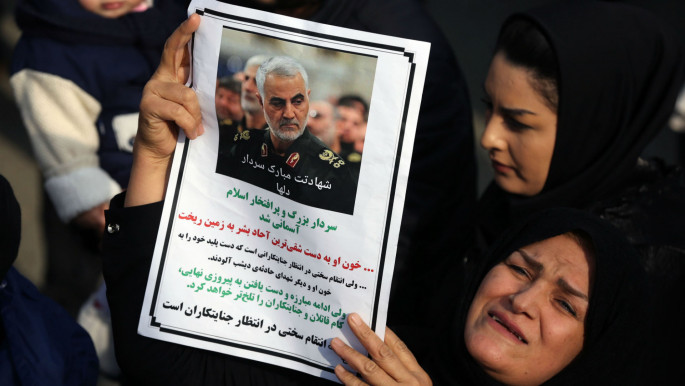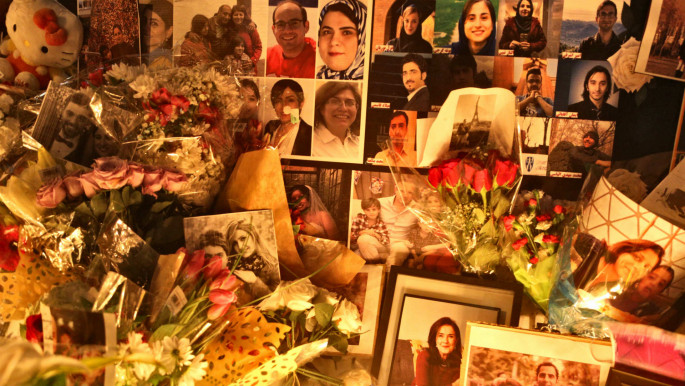How Qasem Soleimani's assassination was an 'ill-conceived effort to contain Iran's growing regional power'
The author of On the Arab Revolts and the Iranian Revolution, speaks to The New Arab about the media's role in serving "political currents" and how LGBTQ+ and women's rights violations weaponised to legitimise war are a construct of the very imperialist machine that condemns them.
If Soleimani had played such an important role in combatting terror movements like the Islamic State group [IS], why was he a US target? In the same vein, those who had never heard of the military leader are hearing he was a threat to international security and as UK PM Boris Johnson has said he, "had the blood of British troops on his hands."
But what were the real underlying motives for the action?
Whether it was a provocation of war or a strategy aimed to help safeguard the re-election of US president Donald Trump, the assassination was an "ill-conceived effort to contain Iran's growing regional power," said Adib-Moghaddam.
 |
| Read also: The significance of Qasem Soleimani's assassination |
The US and the Israeli right wing, he said, had "wrongly assumed" the action would dismantle Iran's relations with its allies.
"It is all about a bigger campaign to destabilise Iran, to weaken the country's allies and to further a regional order that serves the interests of the Trump administration, which are not the same as those of the majority of Americans."
But he said neither the US or Iran are interested in war. What it will lead to, he said, was greater levels of oil and gas market instability, while the US will be seen by Europe, the wider world and even by its allies, as a "reckless force in global politics".
Meanwhile, he said, the situation is likely to impact life for Iranians with the further deterioration of human rights as Iranian leaders "securitise domestic politics even further to avert US-sponsored upheavals."
Upheavals, he said, such as the Trump administration's overt levels of support for some of the demonstrations in Iran.
Adib-Moghaddam said it was this "interference that makes it easier "for hardliners in Iran to denounce even legitimate demands of the demonstrators as externally determined and to crush dissent in the name of national independence."
 |
This interference that makes it easier for hardliners in Iran to denounce even legitimate demands of the demonstrators as externally determined and to crush dissent in the name of national independence |  |
Such legitimate demands include LGBTQ+ and women's rights. The escalation of US-Iran relations has put a spotlight on some of the country's most contentious issues but these should not be weaponised to legitimise wars, he said.
Such weaponisation, is however, part of the "imperial machinery" he said, yet the irony of the matter stems from the fact that homosexuality had been a norm in Iran "well before the ruptures of colonialism and Western imperialisms of the post-enlightenment period – as anyone familiar with the poetry and philosophy of Rumi and Khayyam will attest to."
Iranians, he said are "well aware of the current lack of civil rights as seen by their historic response to authoritarianism, both before and after the revolution."
In the meantime, he added, open admission of media support for Trump's actions in the Middle East is "no conspiracy" either. Neither is the filtering out of Soleimani-friendly posts on social media.
Rather, he said, the media's intonation is underscored by a "well-institutionalised, historically entrenched system of 'truth-making', earning cultural consensus to continuously serve and keep alive a tiny elite system".
And it is within such mainstream social consensus, he said, that "the Iran file meets anti-Arab racism, Islamophobia and other subliminal fears stoked up to legitimate war, whenever it is deemed necessary."
UN officials declared the assassination of General Soleimani illegal and a violation of international law. Scholar Noam Chomsky said it was an act of "international terrorism." Yet the violation, said Adib-Moghaddam, will not lead to any indictment against the US.
He added: "This is not because the assassinations were against international law. They clearly were. But because international law has ceased to be a factor in today's international relations. What we have, is a particularly violent form of international anarchy."
 |
|
| Read also: Texts, selfies, and fear of war: The heartbreaking final moments of Iran's plane crash victims |
Furthermore, he said, the fact that the Israeli government was informed of the killing but US Congress was not, reveals a "global right wing coterie that is pursuing a Mafia doctrine of targeted assassinations that the Israeli state has been pursuing for a while now, too."
"This can't be a recipe for peace and security," he added.
Israeli PM Bibi Netanyahu claimed Trump had acted independently and praised the killing as an act of self-defence that the US had a right to carry out.
Foreign policy for the US is an extension of domestic politics, said Adib-Moghaddam, and Trump has a "clear interest in escalating things by taking decisions not based on strategic calculations."
But the real tragedy of the events, he said, has been the "accidental downing of the Ukrainian civilian airline."
"It was a tragic mistake amidst the threat of a devastating war, and it is symptomatic, certainly unethical, that the tragedy is being exploited by all sides to score ideological points."
He said despite the Iranian military's measured airstrikes against the US army base in Iraq, the tragedy of flight PS752 "shows that wars cannot be contained and that the first victims of them, are often the innocent."
Anu Shukla is a freelance journalist based in London
Follow her on Twitter: @AnuShuklaWrites
Read more from The New Arab Meets special section below:
 |

![Palestinians mourned the victims of an Israeli strike on Deir al-Balah [Getty]](/sites/default/files/styles/image_684x385/public/2024-11/GettyImages-2182362043.jpg?h=199d8c1f&itok=xSHZFbmc)


![The law could be enforced against teachers without prior notice [Getty]](/sites/default/files/styles/image_684x385/public/2178740715.jpeg?h=a5f2f23a&itok=hnqrCS4x)
 Follow the Middle East's top stories in English at The New Arab on Google News
Follow the Middle East's top stories in English at The New Arab on Google News


